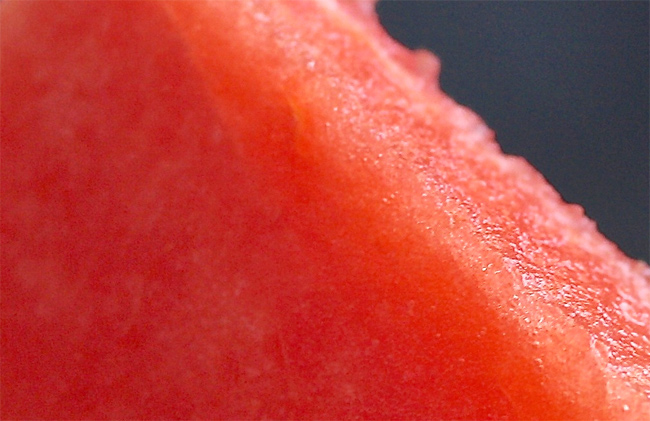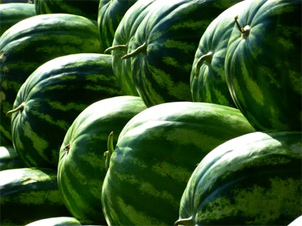Watermelon Juice, Healthy or Not?

I have some mixed feelings and thoughts about watermelon and watermelon juice. In the past, I used to consume a lot of watermelon either as juice or in its raw form. But as of recently, I am not so sure about its health benefits. To me, the main reason of concern is its relatively high fructose concentration.
Sure, if you are young and if you are in a good shape, you can and should enjoy this delicious treat. Your body probably works great, your metabolism is in perfect shape, and a couple of cups of watermelon juice during the summer months will only do you good.
But here’s the thing.
If you are obese, if you struggle to lose weight, if you have metabolic syndrome, if you have prediabetes or type 2 diabetes, it would be wise to avoid this high-fructose food.
Why?
Well, because fructose is metabolized in the liver. The cells of your body cannot directly use it as a fuel source. What’s even worse, the liver usually converts fructose into triglycerides, which is another way to say adipose tissue, or body fat.
So how much fructose is there?
One medium watermelon has a staggering 180 grams of fructose. Even if you consume one quarter of it, that’s way too much for what’s considered a healthy daily intake of fructose (less than 20 grams, and some go down to less than 10 grams a day).

With this disclaimer about fructose in place, let’s continue and concentrate on the health benefits of watermelon and how to prepare a home made watermelon juice.
When it comes to consuming watermelon, it is usually considered that watermelon contains mostly water. Because of that, it is often used as a refreshing food, for example, when the weather is hot.
Watermelon is usually considered fruit, although it is actually a vegetable from the cucumber family. The largest watermelon producers in the world are: China, Turkey, Russia, Greece, Italy, and Spain. The inside of the watermelon is usually red or orange, although there are yellow melons.
There are several hybrids of watermelons created by crossing. They differ in size, color, and shape. A watermelon can weigh up to 25 kg and contain over 90% water. (Don’t be fooled though, the remaining 10 percent can contain a lot of sugar.)
What’s much less known is the fact that besides liquid, watermelon contains plenty of vitamins and minerals. So, on one hand, it can significantly contribute to your health. On the other hand, as we already mentioned, you have to careful, because it has significant amounts of sugar, particularly the most harmful type: fructose.
The watery and nutritional content is what makes watermelon great to compensate for the dehydration and loss of minerals and vitamins during the summer months.
Table of Contents
Nutrients and minerals
 Watermelon contains a lot of water and some calories, so it is suitable to be used as a diuretic and for cleansing the body. In addition, there are some useful ingredients:
Watermelon contains a lot of water and some calories, so it is suitable to be used as a diuretic and for cleansing the body. In addition, there are some useful ingredients:
- Nitric acid
- Copper
- Beta carotene
- Vegetable fiber
- Vegetable fat
- Vitamin A
- Vitamins B1, B2, B3, B5, B6
- Vitamin C
- Iron
- Glutathione
- Essential oils
- Iodine
- Potassium
- Calcium
- Lycopene
- Citric acid
- Magnesium
- Mineral salts
- Proteins
- Folate
- Phosphorus
- Cellulose
- Zinc
- Sugar
Watermelon Juice
 Watermelon can be used as a diuretic and for treating burns and some skin diseases. It regulates the blood pH value, and can help in cleansint the fatty deposits on the blood vessels.
Watermelon can be used as a diuretic and for treating burns and some skin diseases. It regulates the blood pH value, and can help in cleansint the fatty deposits on the blood vessels.
Having a really high alkaline pH value of 9, Watermelon juice belongs to the extremely healthy group of alkaline drinks. You can use this juice for colon cleansing and fasting.
Watermelon juice alone or a combination with other juices can help with the following conditions:
- acne
- anemia
- atherosclerosis
- arthritis
- asthma
- dental and oral cavity diseases
- bronchitis
- headache
- edema
- eczema
- kidney stones
- hangover
- some types of cancer
- infertility
- skin burns
- elevated temperature
- problems with the kidneys, bladder and urinary channels
- problems with the prostate
- sunburns
- sinusitis
- scurvy
- stress
- inflammation of the skin and itching (rash)
- hemorrhoids
- chronic fatigue
- cellulite
How to Prepare Watermelon Juice
You can use a juicer, but that’s an overkill in this case. Just use an ordinary blender. Blend it all for no more than a minute and you are good to go.
You have several options here: you can drink it as is, you can strain it through a mesh, you can add some lemon juice in it for that additional hint of flavor, and you can add water to dilute it.
If you want to maximize the health impact I recommend no filtering, adding some lemon juice, and diluting it with pure water.
Watermelon Juicer Recipe
Ingredients
- 1 small watermelon
- juice from 1 lemon
Instructions
- Cut the watermelon in half and use a spoon to remove the seeds. You don’t have to perfect with this, a couple of seeds here and there won’t cause any harm. Scoop watermelon pieces from the rind and put them in your blender. Don’t use the rind.
- Blend the watermelon for up to a minute. Add lemon juice and blend for another 5-10 seconds. Pour it into a glass and dilute with pure water.
Conclusion
Watermelon is a useful, healthy food, natural detoxification agent, and potent antioxidant (for the prevention of many diseases). Watermelon can compensate for lost fluids and minerals.
That said, watch out for the fructose content, especially if you have excess weight, metabolic syndrome, or diabetes. It might be a good to dilute the watermelon juice to minimize the sugar impact on your body.
Whenever you can, go to your health store or farmer’s market and purchase organically grown watermelons.
Cheers!
Photo 2 courtesy of Andrea Mann

Leave a comment